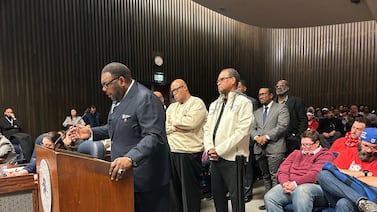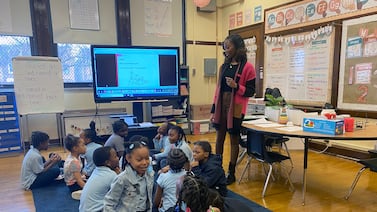Maybe there is such a thing as a free lunch, after all.
Chalkbeat recently reported that a growing number of states — including California, Maine, and Michigan — are now offering breakfast and lunch at school to all students free of charge.
Statewide policies like these are new, but the practice of providing universal free meals isn’t. And researchers have been studying this for years. That means we have a good sense of what these state policies will mean for students, families, and schools.
In short, research suggests that universal school meal programs accomplish their main goal: expand access to breakfast and lunch at school. Relatedly, families with children at schools with universal meals are less likely to struggle to afford groceries. Free meals may also reduce lunch stigma and school administrative burdens.
Universal meals may create academic benefits, too: Some studies show that they improve students’ test scores or attendance rates. Here, though, the evidence is equivocal. Other studies do not show clear benefits or only find them for certain groups of students.
Whether providing universal meals is a good idea may not come down to empirical evidence, though, but moral judgments. Critics point to the costs of the program and argue that it may foster dependency on government.
To some supporters of universal free school meals, the academic benefits are nice, but the case does not rest on them.
“It’s fundamentally immoral to suggest that the public should only provide meals to hungry kids if we can prove that we get better scores on math tests,” said Conor Williams, a senior fellow at The Century Foundation, a progressive think tank. “We should provide meals to hungry kids … because we’re a rich country and kids deserve a dignified childhood where their basic needs are met.”
Here’s what we know from research on free school meals.
Universal meals expand access — including for poorer families
Universal free school meal programs do in fact increase the share of students who grab that slice of pizza or fruit cup. One national study found that the shift increased the number of breakfasts served by 38% and the number of lunches by 12%. Other research shows similar increases.
This makes sense: When school meals are free, more students take advantage of them. The shift is significant but not dramatic because many kids already got lunch from school while others will still prefer to bring food from home.
Research also hints at a less intuitive result: Universal meals may benefit students from poorer families. This is more surprising because kids from low-income families already have access to federally subsidized school meals. (Children from a family of four qualify for reduced-price meals if their household income is below $55,500 and free meals below $39,000.)
Still, research in New York City has found that universal access increases participation among students from low-income families in both breakfast and lunch programs.
There may be a number of reasons for this. Reduced paperwork and stigma could lead more students to participate. So could the shift from reduced-price to free meals. And students whose families have modest incomes may be ineligible some years when their families earn a bit more than the eligibility threshold.
Free school meals help families afford food
Research also suggests that universal breakfast and lunch in school affect families’ grocery budget more generally.
One study found that the expansion of free school meals led to a small drop in nearby food bank usage. Another paper found that universal meals reduced families’ grocery bills by 5% each month. Similarly, it cut the share of families considered “food insecure” by 5%, including among families who were previously eligible for subsidized school meals. This suggests, the researchers say, that “the stigma of free school meals may be declining after universal access.”
A third study also found a reduction in grocery spending after universal school meals. This in turn led grocery stores to cut their prices by about 2.5%. “This paper demonstrates that the National School Lunch Program delivers a substantial indirect benefit to communities,” researchers wrote.
Keep in mind: These studies do not consider the costs of universal school meals, which could come through slightly higher taxes or reductions in other government spending. How this is paid for will vary from state to state.
Universal free meals may improve school climate
Advocates have long suggested that offering free meals for all reduces school meal–related stigma — which can come from peers or administrative “lunch shaming” due to unpaid meal debt.
There do not appear to be many studies on this, but one recent paper finds support for the idea. In New York City, universal meals led to reductions in bullying, according to surveys of students.
“What I found pleasantly surprising was that it improves the school climate for all students,” researcher Emily Gutierrez previously told Chalkbeat. “It’s sort of this whole school ripple effect.”
Inconsistent evidence of academic benefits from free meals
Research on the academic effects of free school meals has produced a range of findings.
For instance, studies in New York City found improved test scores due to free lunch, but not free breakfast. In South Carolina, free meals boosted math test scores and attendance rates among elementary school students. There weren’t clear effects for middle schoolers.
In some cases, there were improvements on certain dimensions but not others. A Tennessee study found lower discipline rates, but no impact on test scores or attendance. In North Carolina, universal meals improved attendance rates in elementary and middle school and reduced suspensions in middle and high school, although test score effects were uneven. An Oregon study found declines in suspensions, while a Georgia paper found no impact on attendance.
Broader studies have also produced uneven results. One national study showed that universal meals did not improve test scores overall. But for schools that had low rates of meal participation beforehand, test scores in math improved slightly. Another national paper showed reductions in suspension rates for certain student groups. An experimental study found that universal breakfast programs had no clear impact on test scores, attendance, or tardiness.
Overall, the research suggests that there may be some academic benefits from expanding free meal access. But such gains are not consistent. This is not too surprising. Free meals do not target academics and only change meal access for a small share of students, since many previously got meals at school.
In other words, while policymakers might not want to pursue universal meals as a strategy for raising test scores or other academic outcomes, some improvements might be a welcome side benefit.
Matt Barnum is interim national editor, overseeing and contributing to Chalkbeat’s coverage of national education issues. Contact him at mbarnum@chalkbeat.org.





